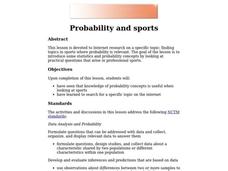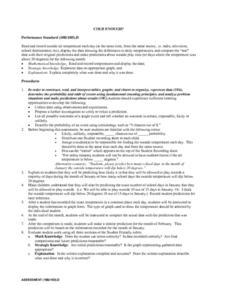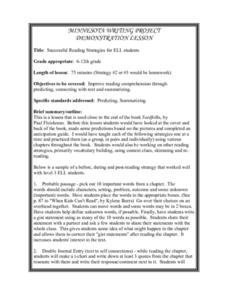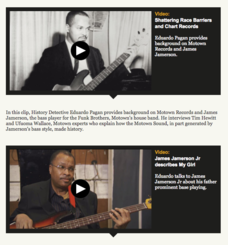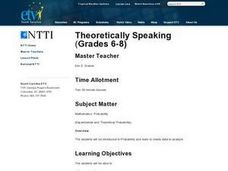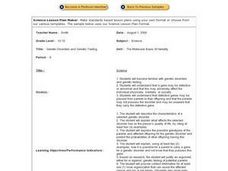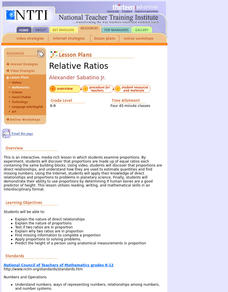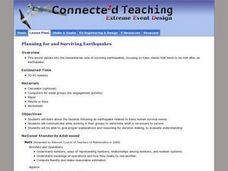Curated OER
Do You Feel Lucky?
Young scholars calculate simple probabilities using mathematics then roll dice to test their predictions.
Curated OER
Advanced Algebra: Do You Feel Lucky?
Pupils explore the realm of mathematical probability while playing a game of chance. after constructing paper rockets, they fire it enough times to determine the probabilities of the rocket traveling past a marked distance and of it...
Curated OER
Probability and Sports
Students research topics on the internet where probability is relevant. Students study statistics and probability concepts by looking at practical questions that arise in professional sports.
National Wildlife Federation
When It Rains It Pours More Drought and More Heavy Rainfall
Which is worse — drought or flooding? Neither is helpful to the environment, and both are increasing due to climate change. The 16th lesson plan in a series of 21 covers the average precipitation trends for two different climates within...
Curated OER
Predicting Severe Weather
Students recognize the range and variety of severe weather. They plan for severe weather conditions that they may experience on an immediate and long-term scale and use climate information to make personal choices about where to live and...
Curated OER
Cold Enough?
Students read and record temperatures and display the data. They represent the temperatures on an appropriate graph and explain completely what was done and why it was done. Students display the data showing differences in the daily...
Curated OER
Successful Reading Strategies for ELL Students
Students improve their reading comprehension through predicting, connecting with text and summarizing. Students should have already read the book Seedfolks and made predictions based upon what they had seen from the cover and pictures...
Curated OER
Investigation 8 - Weather Forecasts
Fourth graders examine how to predict and evaluate weather forecasts. Discuss with students why weather predictions are important to us. Ask them what people do after they hear a forecast. They brainstorm reasons forecasts are important...
Curated OER
Night of the Twister
Young scholars use reading strategies for Night of the Twister. In this reading strategies instructional activity, students name five major catastrophes and books about each. Young scholars complete a vocabulary section, make inferences...
PBS
The Sixties: Hitsville USA
James Jamerson. You probably heard him but may not have heard of him. But fans of Motown Records will certainly recognize his contributions to the sound that desegregated popular music during the 1960s. Challenge young history...
Curated OER
Theoretically Speaking
Learners define probability. They determine outcome from a given situation based on simple probability. Students create experimental data using a coin and a number cube. They write how theoretical and experimental probability are different.
Curated OER
Probably Passage
Young scholars apply reading strategies to improve understanding and fluency. They use their imagination and create their own short stories. They identify words as various parts of the story - including setting, character, problem,...
Curated OER
Unit 3: Scientific Writing
Write-on! Demonstrate a writing model and support learners as they write an informational essay on a water resource issue of your (or their) choosing. The lesson plan provides a well-scaffolded summative writing...
Curated OER
Plum Stone Dice Game
Young scholars read about a Native American dice game online. They make replica games, and practice playing with them. They predict the outcome of the dice rolls by completing a dice throw chart.
Curated OER
Is Global Warming Happening?
Students investigate the probability of global warming and the effects of global warming on the environment. They conduct Internet research and collect data, transfer the data onto an Excel spreadsheet, and create a presentation that...
Curated OER
Statistics and Shopping
Students explore the concept of using consumer data and statistics to aid in the consumer decision making process. In this consumer data and statistics lesson, students research consumer data and statistics. Students analyze the data...
Curated OER
X Is For Wonderment
Young scholars engage in a lesson that is concerned with the "X" chromosome and how ti is part of genetics with the use of Punnett squares. They use this tool in order to predict future genetic outcomes while focusing upon specific...
Curated OER
Mendellian Genetics
Young scholars describe the inheritance patterns other than simple dominance. They are taught how Mendel's principles apply to all organisms. Students review the use of Punnett Squares. They are taught the principles of probability...
Curated OER
Genetic Disorder and Genetic Testing
Sixth graders explore the characteristics of a selected genetic disorder and research relevant information to justify an argument either for or against genetic testing. Your class can work in groups to gather specific information in...
Curated OER
Ocean Currents and Sea Surface Temperature
Students use satellite data to explore sea surface temperature. They explore the relationship between the rotation of the Earth, the path of ocean current and air pressure centers. After studying maps of sea surface temperature and ocean...
Curated OER
Relative Ratios
Students discover that proportions are made up of equal ratios each containing the same building blocks. They, using the Internet, apply their knowledge of direct relationships and proportions to problems in planetary science.
Curated OER
The Numbers Tell the Story
Students demonstrate how to gather and interpret statistical data. In this data analysis lesson plan, students search for statistics on the health effects of smoking and place the information into charts. Students create these charts...
Curated OER
Technology Blackout Day
Learners describe the impact of modern technology inventions on daily life. They create a graph of the class's favorite item of technology and draw a picture of their favorite piece of modern technology.
Curated OER
Planning for and Surviving Earthquakes
Students work in small groups to explore the FEMA for Kids site. They take the role of FEMA officials. Student list three items they may need to survive an earthquake. They complete a worksheet and discuss their results with the rest of...


